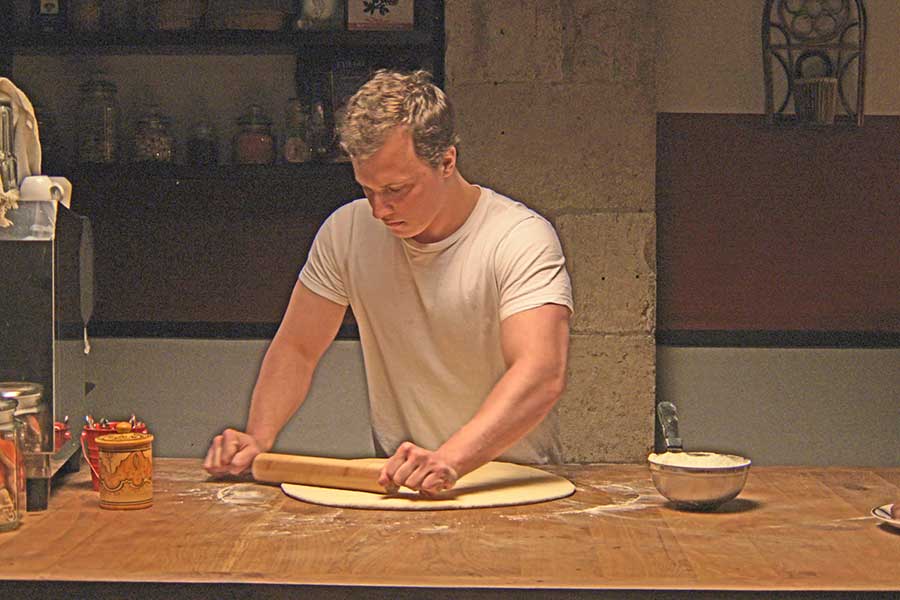Out gay writer-director Ofir Raul Graizer’s gentle, absorbing drama, “The Cakemaker,” opening July 6 at the Landmark Ritz at the Bourse, begins with businessman Oren (Roy Miller), a married father from Israel, frequenting the café in Germany where Tomas (Tim Kalkhof) works and bakes. The two men initiate a passionate tryst that ends unexpectedly when Oren is killed in a car accident. This tragedy prompts Tomas to travel to Jerusalem to visits the café owned by Oren’s widow, Anat (Sarah Adler).
When Tomas gets a job washing dishes for Anat, he starts baking cookies for her café. However, he is not Jewish, so his pastries are not kosher. Yet they are a success, so Anat works around the kosher law to sell them. She soon initiates a deeper, more personal relationship with Tomas — unaware he was her husband’s lover.
Via Skype from Germany, where he has emigrated, the Israeli-born filmmaker spoke about making “The Cakemaker” and the intimate connection that develops between Tomas and Anat. As both grieve for Oren, they comfort themselves with food. The film features many scenes of characters preparing food and eating as a way of coping with their loneliness and palpable sense of loss.
And food is a key element in Graizer’s life. A gastronomist, the filmmaker said he teaches cooking and is writing a cookbook. He highlighted the connection of food and feelings, recalling how his family gathered together on Friday evenings to break bread, and the sense-memory pleasure of, say, eating a birthday cake your mother made when you were a child.
Moreover, Graizer’s emotional bond to food was emphasized when the filmmaker moved to Berlin. “I was with a group of immigrants and we got together and cooked and rolled eggplant and talked about the difficulties and adventures we had,” he said, citing an example of how food bonds people.
The filming of “The Cakemaker” was also an adventure for Graizer, who shot it in 21 days and for less than $200,000. He described it as a “guerilla movie,” recounting how people objected to the filmmakers posting a non-kosher sign in Anat’s café window for a key scene in the film, forcing the crew had to hang it, shoot and then leave. Likewise, a montage featuring Tomas baking chocolate cakes was filmed only when the production’s cameraman and sound guy sneaked into the location on a Saturday (when Jerusalem observes the Sabbath) to shoot the baking montage.
The kitchen is also a place where Anat seduces Tomas, creating a love triangle of sorts with the ghost of Oren. Graizer emphasized that the sex between Anat and Tomas is not about their sexuality. “When I wrote the film, it was clear to me that [this sex scene] would happen. Tomas is gay, but he can do it. When I tried to think — is it possible or not? — it didn’t matter.”
The sex is about more than sex, the filmmaker said.
“They fuck, but it’s about connecting after being alone and feeling the presence of Oren in the kitchen with them. For her, it’s defying the memory of Oren, saying, ‘I can do what I want.’ And for Tomas, it is saying, ‘I want this, I want to try this. She is good, and open to me, and I can take Oren’s place. This is the way I can do that.’ It may not be conscious, but it’s beyond the definition of sexuality.”
As “The Cakemaker” shows, the characters ultimately find themselves through breaking social laws. Significantly, Graizer does not condemn his characters for their deceptions.
“I can be angry with Oren for having an affair, or for Tomas giving Anat sex, and touching her, which she needs,” he said. However, the film allows audiences to understand the reasons for the characters’ behavior.
“It was important to show why Oren made his choice to find a job out of Israel and in Berlin. Oren is gay. He came from a religious family. He married a secular woman and raised a son,” the director added.
Tomas’s relationship with Oren is only seen briefly in “The Cakemaker.” However, it is critical to shaping the film’s power. Graizer acknowledged he deliberately downplays the relationship between the men: “In the beginning, you don’t think it’s a great love; it’s an affair more important for Tomas than Oren.”
But it soon becomes clear how important the relationship has been for the lonely Tomas — and this is what makes “The Cakemaker” resonate.

